Know how to wait
Know how to wait
Know how to wait
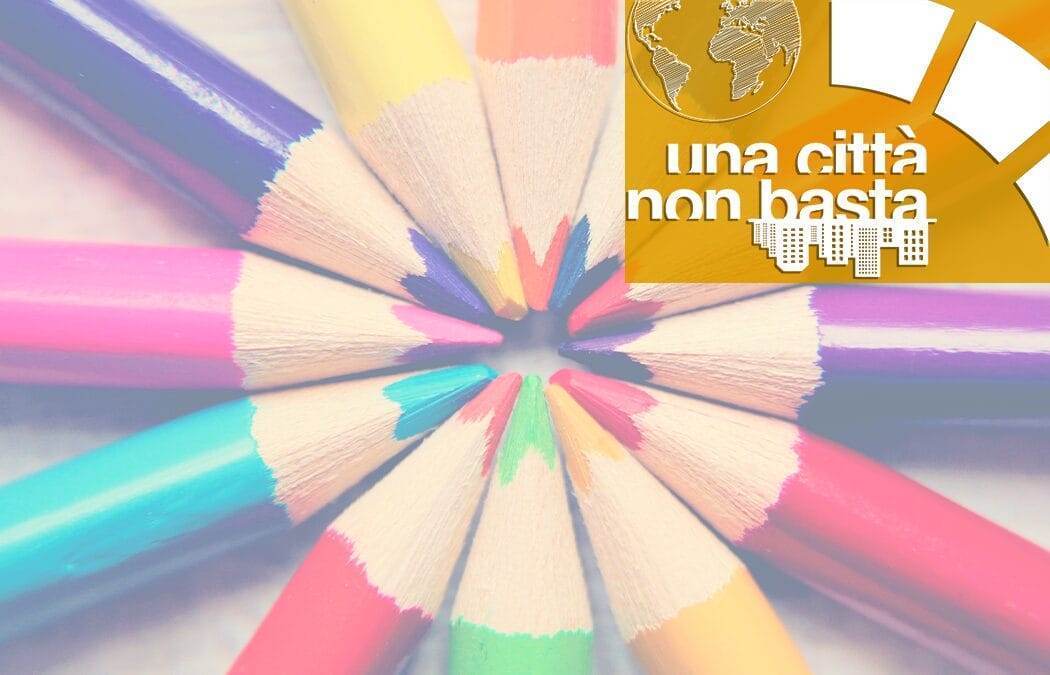
“The competition has been and remains a unique way to introduce Chiara Lubich, founder of the Focolare Movement, to younger generations and to an audience that engages with her work on a cultural level,” says Giuliano Ruzzier, a teacher and collaborator of the Chiara Lubich Centre.
Promoted by the Ministry of Education and Merit, New Humanity and the Historical Museum Foundation of Trentino, this year’s theme is peace. Participants are encouraged to explore the meaning of peace in light of Chiara Lubich’s contributions. Ruzzier explains, “From her extensive legacy, particularly where she explicitly addressed this theme, we have identified four perspectives from which to reflect on peace.”
These perspectives include constructive dialogue among people of different religions and cultures, overcoming economic disparities, fostering personal commitment to fraternity through relationships of proximity and spreading a culture of peace. Prof. Giuseppe Ruzzier continues, “Chiara Lubich viewed humanity as a whole. She is well-known for her call to ‘love others’ countries as our own. Her emphasis on everyday relationships is particularly distinctive. As she said, our days can be filled with practical, humble, intelligent acts of service, expressions of our love. Every little gesture has an effect on society.”
The contest is open to primary, middle and high school students. “As in past years, we especially hope for broad participation from Italian schools abroad, given the clear international scope of this year’s theme.”
When asked how he would encourage his colleagues to promote this initiative, Ruzzier replies: “This contest offers students the chance to reflect independently and creatively on a highly relevant and important topic like peace. It also provides an opportunity to engage with the significant thoughts of a woman who profoundly shaped and experienced the 20th century and expressed herself in many ways.”
The deadline for submissions is 31st March, 2025. For the contest rules and additional information, visit:
https://chiaralubich.org/concorso-per-le-scuole-2024-25/
Carlos Mana
Be silent before each person
Do good
Look kindly on all

Kindness
This morning, while shopping at the supermarket, I passed by a large trolley where a shop assistant was piling up boxes. I noticed two of them were on the ground.
Fearing that I had inadvertently dropped them, I apologised, picked up the boxes and placed them on the trolley.
The shop assistant thanked me and said not to worry, then called after me: ‘Kindness is rare!’. Another person who was passing by just at that moment confirmed: “That’s very true!” whereupon the shop assistant, by way of explanation, told her what had happened.
As for me, I was happy, not least because this little episode reminded me of a phrase I had heard some time ago which had struck me. It spoke about “sowing kindness”. It felt like a ‘caress’ from God.
G.S. – Italy (*)
Healing relationships
I have a brother, a Catholic Christian, who married a German woman from the Evangelical Church. When they settled in Italy, the relationship between my mother and sister-in-law was not easy, even though she was not against their children being educated in the Catholic Church. As for me, I tried to be a ‘mediator’ between her and my mother. My sister-in-law also suffered because of this misunderstanding, which was however healed shortly before our mother died. For some time now, I have been sharing the ‘Thought for the Day’ with her via Whatsapp which helps us to live Gospel-based love on a daily basis. One day the thought invited us to ‘be merciful’, with this short commentary sentence: “Mercy is a love that knows how to welcome every neighbour, especially the poorest and neediest. A love that does not measure, is abundant, universal, concrete”. Her response was immediate: ‘If I have made you feel bad in certain circumstances over the past years, please forgive me”. Astonished, I replied in turn: “I too apologise”. And she: “I don’t remember any incident for which need to apologise…’.
C. – Italy (*)
Called and sent
Someone very dear to me asked me to write something about my experience as a teacher for an acquaintance of hers from another country who was doing a project on values education.
I realised that it was an opportunity to transform into a testimony and ‘proclamation’ what, in some ways, has been my personal response to the ‘call’ to live according to the teachings of the Gospel as a teacher and as a mother.
The piece took many hours of writing, deleting, correcting, rewriting, remembering aspects that I could add, deleting others that seemed irrelevant and, above all, filtering each word with love. I tried to put myself in the place of the person I was writing for, because even though I did not know her, I could love Jesus in her.
I sent it to my friend, aware that it might not be exactly what she needed, and so was ready to change everything.
To my surprise, she replied: “I have already sent your letter. I really liked it”. No doubt it was not the writing itself that was liked, but the work that God had done in me which could be a little light for others by being shared.
And, of course, the other things I had to do in those days were easily taken care of, as there had been some changes in the rota that left me with more free time.
C.M. – Argentina
Edited by Carlos Mana
Photo © StockSnap-Pixabay
(*) From ‘The Gospel of the Day’ November-December, Città Nuova, Rome 2024.
Revive hope
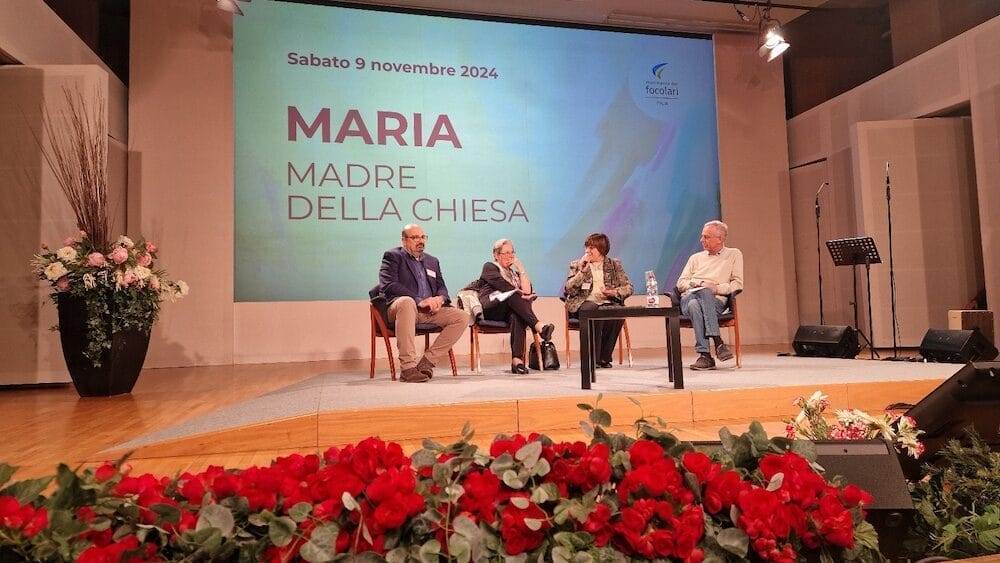
Experiencing the Church in its community dimension through the synodal method. This was one of the messages that emerged from the ecclesial convention organized by the Focolare Movement of Italy and Albania that was held in early November at the Mariapolis Center of Castel Gandolfo in Italy. An event that was attended by about a thousand people, of different ages and vocations, who adhere to the spirituality of the Focolare Movement, but also representatives of other associations.
Cristiana Formosa and Gabriele Bardo, Focolare leaders in Italy and Albania highlighted the path taken so far together with other groups of the Italian Church. It all stemmed from “a deep dialogue that grew over time, between priests and laity; a working together, people from all the branches of the Work of Mary (or. The Focolare Movement); a growing appreciation of all those who work in various capacities in the local church and in diocesan and national bodies. […] We feel that in recent years this sensitivity has grown a lot within the Movement, and both at the national and local levels there is much more collaboration with other Movements and Church Associations.”.
On the first day, Prof. Vincenzo Di Pilato, professor of Fundamental Theology and Academic Coordinator of the Centro Evangelii Gaudium emphasized (text) the figure of Mary as Mother of God and Mother of humanity, highlighting the Trinitarian root of the incarnation and Mary’s social dimension.
This was followed by Card. Giuseppe Petrocchi who deepened the reality of being church today, emphasizing how one needs to have a value compass to understand how to move, what church to be and how to be church. One must study and love the sociocultural context of the area in which one acts as well as being attentive to signs of the times: what the Lord is asking of us today.
Space then was given to various experiences on educational projects aimed at marginalized people, on the new generations, universal fraternity, the option for the “poor” for an inclusive synodality.
The second day was enriched with the presence of Dr. Linda Ghisoni, Under secretary of the Dicastery for the Laity, Family, Life, who brought greetings and encouragement from the Prefect of the Dicastery Card. Kevin Joseph Farrell. Dr. Ghisoni delivered a meditative reflection entitled “Marian dimension: a Church with a synodal face”. By retracing Mary’s life, she affirmed that we too must “trust God who is faithful. It’s up to us, far from all self-driven triumphalism, to be present in the face of the toughest situations in our society, in our family, in our movement. We should not be ashamed if we seem to belong to a group of failures, if we have people among us who are weaklings, and we should welcome the call to an ever-new generativity, proclaiming with closeness, care, listening, with intelligence, attention and dialogue, that God is faithful, is close, is merciful.”.
And she recalled the words that Cardinal Farrell addressed to the Focolare Movement on the 80th anniversary of its birth: “The ideal that Chiara (Lubich) transmitted to you remains ever relevant, even in today’s secularized world which is so different from that of when the Movement began. Your charism contains in itself a great life giving energy, but as the Holy Father often says: ‘it is not a museum piece… it needs to come into contact with reality, with people, with their anxieties and problems. And so, in this fruitful encounter with life, the charism grows, is renewed, and also reality is transformed, is transfigured through the spiritual force that such a charism brings with it.’”
With Marina Castellitto and Carlo Fusco the topic on the universal call to holiness was explored further through the figures of some Focolare members for whom the cause of beatification has been initiated.
This was followed by the experience of the Social Week of Italian Catholics held in Trent in July 2024. “Those days were an experience of listening and deepening the here and now of our time: questioning us about our being a community of believers in the larger ecclesial community and therefore politics as a history and network of human relationships,” stated Argia Albanese president of the Political Movement for Unity (Mppu) Italy.
The day continued with the experience of the National Council of Lay Aggregations (CNAL) in the presence of secretary Dr. Maddalena Pievaioli. The Council is the place where they live their relationship with the Italian Episcopate in a unified form, offering the richness of their associations and actively welcoming its programs and pastoral indications. The wish is that we can increasingly spread this reality within the Associations.
We concluded with the sharing of some best practices such as the Evangelii Gaudium Center, the experiences of the Diocesan Movement of Pesaro and Fermo, and insights on ecumenical and interreligious dialogue, dialogue with people of nonreligious beliefs, and dialogue with the world of culture.
Present on the last day were Margaret Karram and Jesús Morán, President and Co-President of the Focolare Movement. Margaret talked about her recent experience at the synod as one of nine specially invited guests. “The Synod, with its 368 participants, including bishops and laity, of whom 16 were fraternal delegates from other Christian Churches, offered us a perfect example of the universal dimension of this hope,” Margaret said. “We came from 129 nations and each of us was a bearer of our own experience of peace, of war, of poverty, of prosperity, of migration, of joys and sorrows of all kinds. So I would say that the first message, perhaps the most important, is the deeply missionary dimension of the Synod. […] And the first lesson we learned is: walk together, witness together, we need each other. The second lesson was the spiritual practice of discernment that requires: inner freedom, humility, mutual trust, openness to newness.” (…) Our responsibility is “to become bearers of synodality in every sphere: the ecclesial one in primis (first place), Just think of how many of us, and here you will be many! are engaged in our own local Church. But, we members of the Work of Mary, we cannot limit ourselves only to this sphere, we are a lay Movement and this lay characteristic is essential, it comes from the Charism and we cannot lose it. The Synod has stressed on many occasions that we must ‘widen our tent’ to include really everyone, especially those who feel outside.”
Jesús Morán gave a meditation-reflection on being a Church of Hope today. “Hope,” he said, ”makes us overcome fear. Hope must be united with faith and love, the three sisters of the theological life. Hope is a communal virtue; it frees us from the isolation of anguish and launches us toward ‘us’; an ‘us’ that becomes concrete love for our brother.”.
Link ai video
Lorenzo Russo
Photo: FocolarItalia
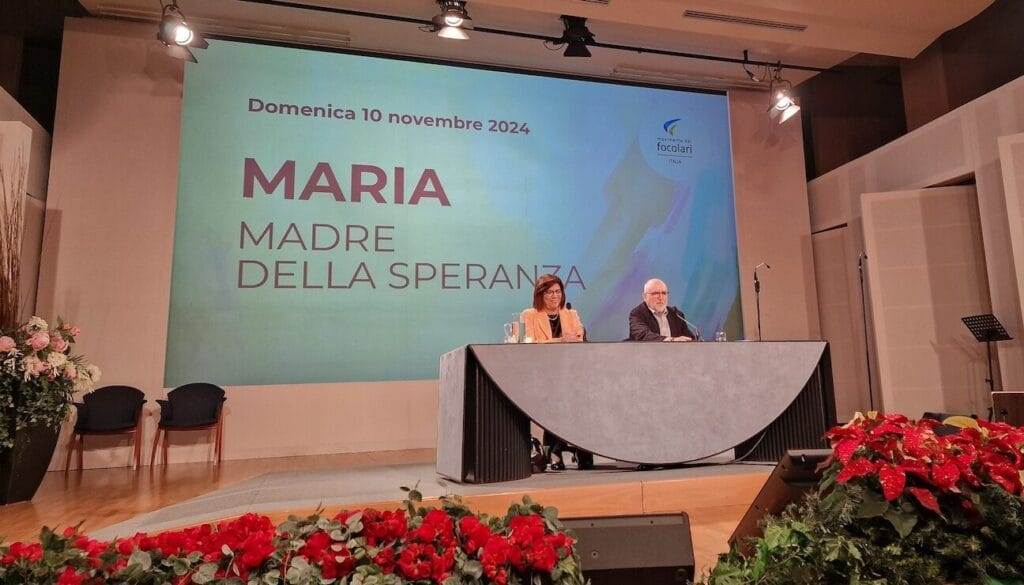
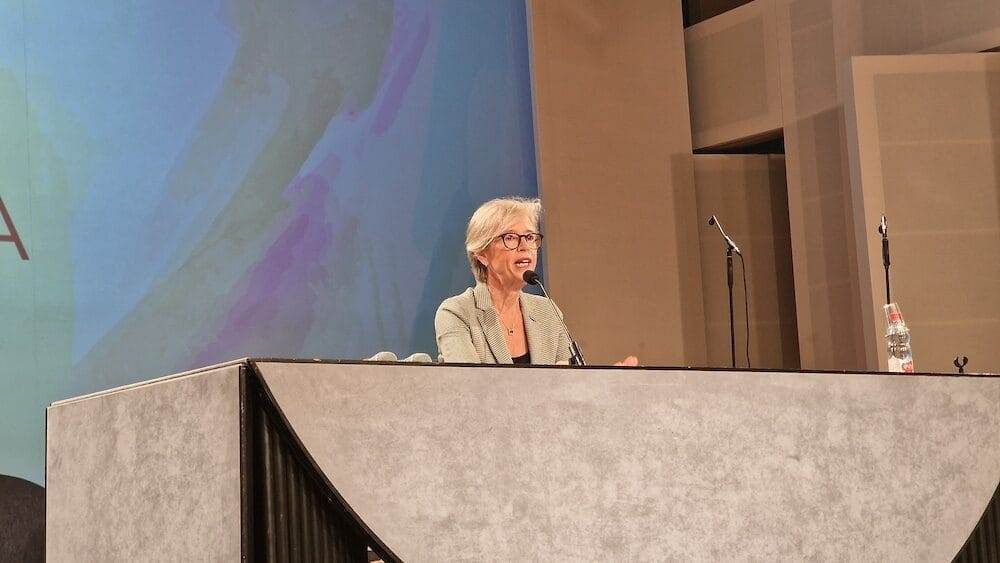
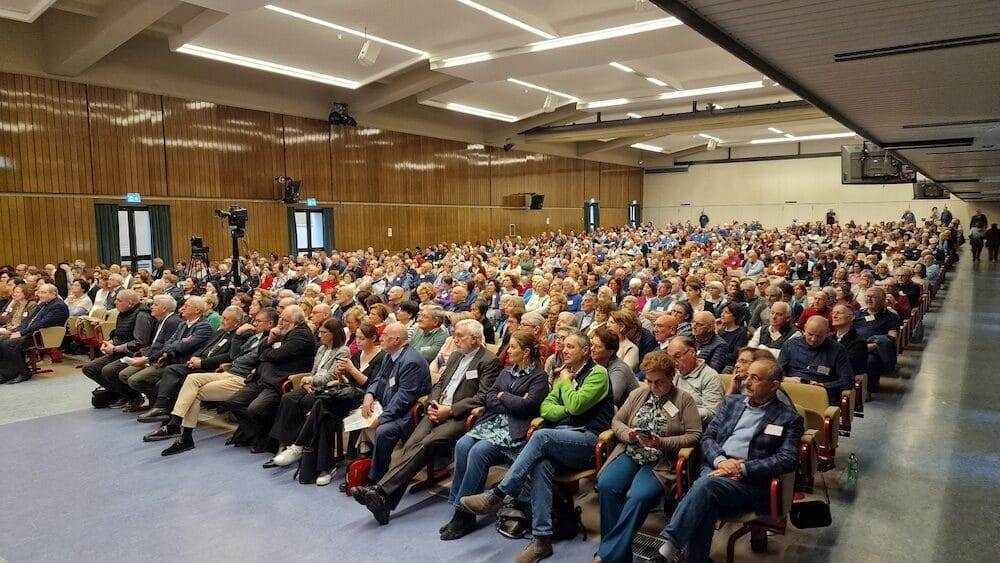
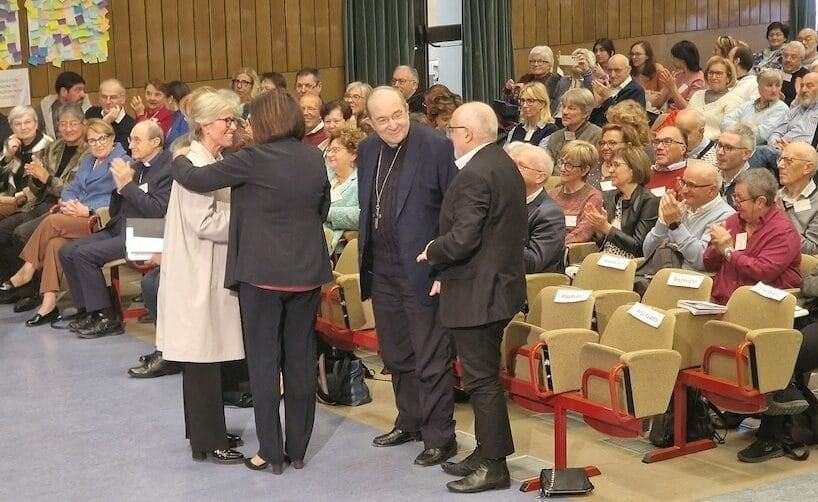
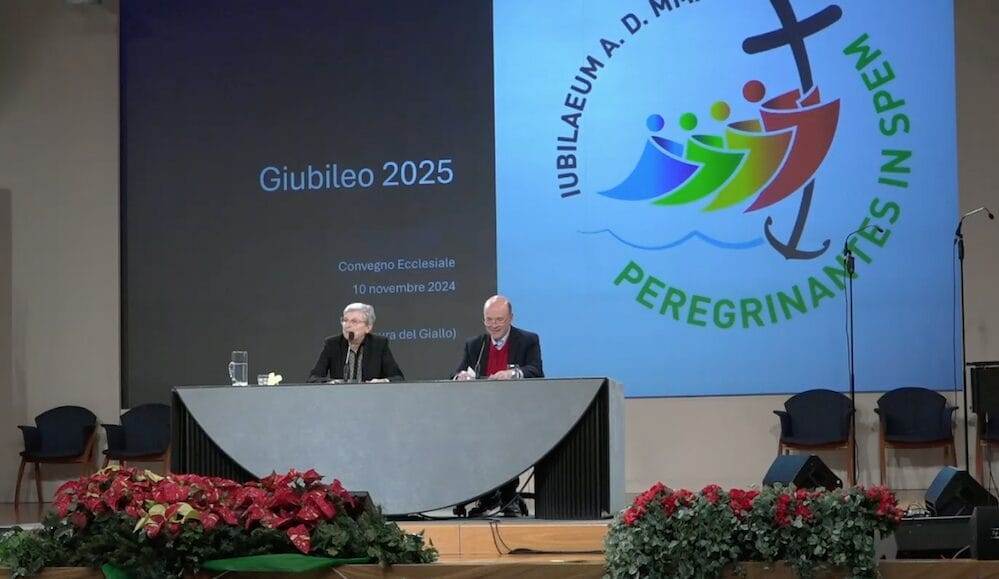
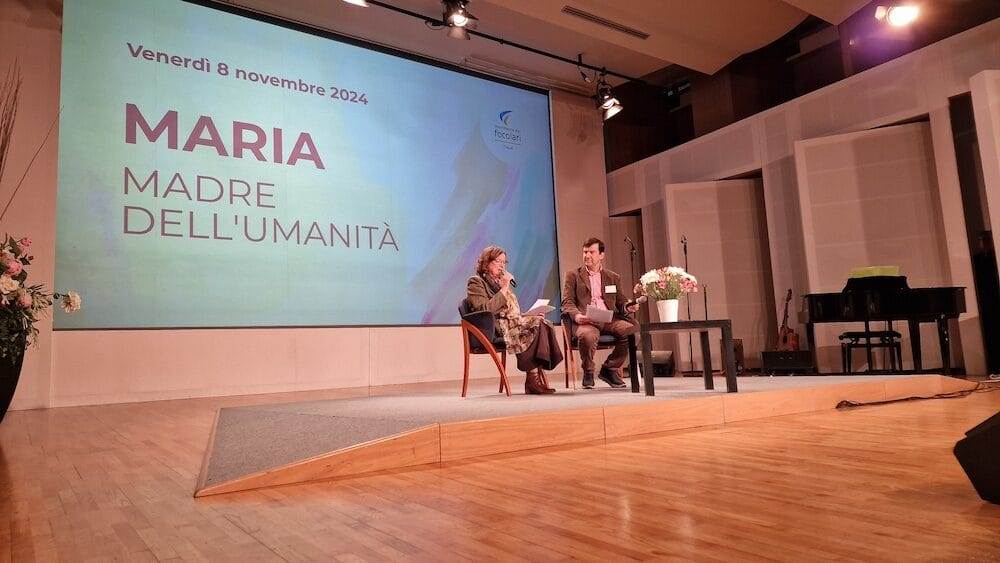
Give value to daily activities
Whoever loves, reigns!